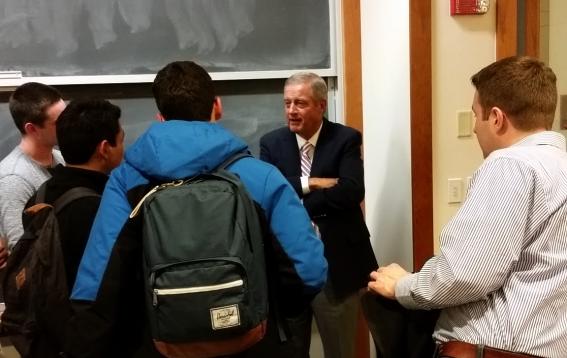David Gaunt ’70 MBA Revisits His Real Estate Career in Manhattan
May 27, 2015

“With this sequence, you’ll start 1000 miles ahead of where I did,” Gaunt told the students. After completing the current course, many of them will take Real Estate Finance, Analysis and Investment next fall. Then, they will complete the series with the project-based Real Estate Practicum, also taught by Wilson. In that course, students deploy state-of-the art real estate modeling software in analyzing financial, marketing, and other considerations for 3-5 actual property investments.
The real estate series is affiliated with the Berthiaume Center for Entrepreneurship, a new campus-wide initiative coordinated through Isenberg. During Gaunt’s visit, the students gained a strong appreciation for the symbiosis between real estate and entrepreneurship from the Isenberg graduate’s tales of his own entrepreneurial career.
Entrepreneurial Beginnings
“I stumbled onto real estate in the 1970s,” confessed Gaunt, whose talk focused on his formative years in the business. Back then, Gaunt and his young family aspired to move to a brownstone in Manhattan’s rent-controlled, supply-choked real estate market. To make that happen in tandem with his modest salary as a commercial banker and corporate loan officer with Chase Manhattan, he invested in an undervalued building, raising capital by recruiting eight or nine friends as limited partners, in the purchase and conversion to condo units, including his own apartment in the brownstone.
That proved a point of departure for future investments, where as general partner in undervalued buildings, Gaunt would recruit 9 or 10 limited partners who would invest separately, earning superior returns. For added cash flow, he would at times share risk with a second general partner.
At the same time, Gaunt developed an elaborate set of strategies for buying properties, which increased their value while lowering his expenses. “I became an expert in New York City’s byzantine regulations,” he told the students. Through expenditures for roofing, boiler systems, intercoms, and other improvements, he eliminated building violations, increased efficiency, and improved his capitalization rates.
Taxing Challenges
It was the era of petroleum shock pricing fueled by Middle East embargos. “Fuel became the single biggest expense,” explained Gaunt, who invested in dual gas-oil boilers, which cut fuel bills in half by using cheaper gas in all but the coldest months. Gaunt’s other major expense was real estate taxes (15% of rents). Through conversations with assessors, he learned where he was paying too much—which taxes to contest. Becoming an expert in property valuations, he succeeded in reducing taxes on some of his properties by as much as two thirds.
Gaunt would also look for poorly managed, rent controlled properties in New York where residents, without permission, were subleasing at exorbitant rents. He would then capture some of those rents. He also secured cash flow and spread his risk by buying mixed-use buildings that included rents for retailers. And he cultivated brokers based on reliable expectations of mutual advantage.
Later on, in the 1980s, he bought rental properties in the East Village timed with the skyrocketing student population at NYU. (The university had dramatically expanded its student population without sufficiently growing its student housing.)
“Ultimately, I look for opportunities that create greater value. Some of them are hard to describe,” Gaunt told the students. “Real estate is like a puzzle. Sometimes you mess up but by solving problems, you can create gold out of coal.”